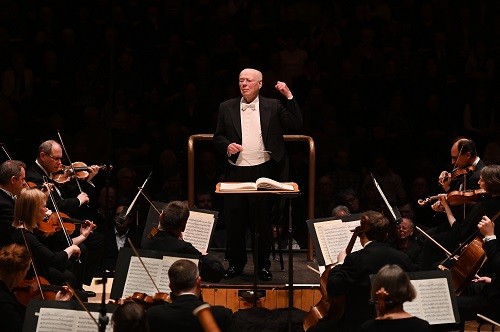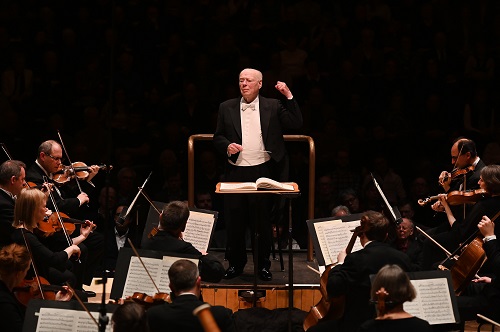 United Kingdom Mozart and Bruckner: Till Fellner (piano), London Symphony Orchestra / Bernard Haitink (conductor) Barbican Hall, London 10.3.2019. (CSa)
United Kingdom Mozart and Bruckner: Till Fellner (piano), London Symphony Orchestra / Bernard Haitink (conductor) Barbican Hall, London 10.3.2019. (CSa)

Mozart – Piano Concerto No.22 K.482
Bruckner – Symphony No.4 (Second version 1877-78, ed Nowak 1953 with 1880 Finale)
Now a little frailer and diminished in height, Bernard Haitink took his place on the Barbican Hall’s podium somewhat gingerly to conduct the LSO in the first of two concerts to celebrate his recent 90th birthday. Happily, despite reaching such a venerable age, this great conductor’s unparalleled artistry, intellectual rigour and interpretive vision remain as strong as ever.
Haitink is a man of disarming modesty. In a recent BBC Radio 3 interview, he sheepishly confessed that as a boy, he had no idea that he wanted to be a musician despite a fanatical interest in classical music. ‘I’m still surprised’ he added with a self-effacing chuckle.
In a distinguished career spanning 65 years, 38 of which have been spent as Chief Conductor of the Royal Concertgebouw Orchestra, he is regarded first and foremost as collaborative, not a dictator. ‘Unlike some, I don’t tell players to do things. I merely suggest to them how to do things.’ The forging of a relationship based on teamwork is a sensitive process, built on mutual trust and respect. Haitink carefully plots the direction of the musical journey, firmly taking hold of the interpretive reins with which to steer the orchestra, but gives his group of excellent and highly trained instrumentalists its head. Haitink’s collaborative approach has proved richly rewarding, earning him the devotion and gratitude of his players. In ceding them a degree of musical autonomy, he energises them and releases a wellspring of freshness and vitality in the music.
These were much in evidence in the first of three Barbican concerts marking the conductor’s 90th birthday which proved to be a perfectly balanced programme – Mozart’s Piano Concerto No.22 K.482, followed by Bruckner’s Symphony No.4.
Austrian pianist Till Fellner joined the orchestra in the Mozart concerto and played with manicured precision and limpid beauty. Haitink, the precise, clean beats of his baton and minimal gestures of his left hand unostentatiously capturing the courtly grandeur of the concerto’s opening Allegro, coaxed a series of deliciously playful conversations between piano, woodwind and horns in the Andante second movement. Fellner’s measured playing was particularly delicate in the third movement finale – a dancelike rondo whose melodies and instrumental textures hint at two other masterpieces written by Mozart during the same period: The Marriage of Figaro and Così fan tutte. Fellner decided to include the great Hummel cadenza, its complex Bach-like counterpoint providing a fitting contrast to the exuberant E flat refrain with which the work concluded. When it did, Haitink bowed gravely and then moved to the end of the platform from where he bashfully led the applause for his soloist.
The second part of the evening was filled with an exceptionally expansive account of Bruckner’s Symphony No.4, nicknamed Romantic. It was a performance to cherish. Lasting one hour and twenty minutes, the work can test the endurance of the youngest conductor, yet, for the most part, Haitink stood with almost military bearing like a benign general engaging his troops. The first movement, marked Bewegt, nicht zu schnell (with movement but not too fast), was perfectly paced. From the French horn’s opening introduction over a glistening string tremolo, Haitink conjured up the sound world of Bruckner’s magic forest murmurs, with its fleeting allusions to a medieval city at dawn, knights on horseback, distant hunts and birdsong. The second movement Andante, an elegiac ‘funeral march’, never dragged for a moment. Its atmosphere of subdued urgency was contrasted in the so-called ‘Hunt’ Scherzo with a breath-taking fortissimo explosion of full brass followed by a bucolic Ländler trio. In a monumental and radiant Finale – in which fragments of the first movement and Scherzo are recapitulated and crystallised – Haitink’s vision never faltered and steady beat never flagged.
Haitink quickly returns to the Barbican in two further concerts with the LSO in which Dvorák’s Violin Concerto will be twinned with Mahler’s Symphony No.4. We are told that there will then be further engagements in Paris before this much-loved maestro – a term he despises – takes a sabbatical. Let’s take him at his word and bid him au revoir for we are not yet ready to say goodbye.
Chris Sallon
